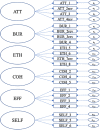Developing and validating a new scale to measure the acceptability of health apps among adolescents
- PMID: 35154802
- PMCID: PMC8832596
- DOI: 10.1177/20552076211067660
Developing and validating a new scale to measure the acceptability of health apps among adolescents
Abstract
Background: The acceptability of health interventions is centrally important to achieving their desired health outcomes. The construct of acceptability of mobile health interventions among adolescents is neither well-defined nor consistently operationalized.
Objectives: Building on the theoretical framework of acceptability, these two studies developed and assessed the reliability and validity of a new scale to measure the acceptability of mobile health applications ("apps") among adolescents.
Methods: We followed a structured scale development process including exploratory factor analyses (EFAs), confirmatory factor analyses (CFAs), and employed structural equation modeling (SEM) to assess the relationship between the scale and app usage. Adolescent participants used the Fooducate healthy eating app and completed the acceptability scale at baseline and one-week follow-up.
Results: EFA (n = 182) determined that the acceptability of health apps was a multidimensional construct with six latent factors: affective attitude, burden, ethicality, intervention coherence, perceived effectiveness, and self-efficacy. CFA (n = 161) from the second sample affirmed the six-factor structure and the unidimensional structures for each of the six subscales. However, CFA did not confirm the higher-order latent factor model suggesting that the six subscales reflect unique aspects of acceptability. SEM indicated that two of the subscales-ethicality and self-efficacy-were predictive of health app usage at one-week follow-up.
Conclusions: These results highlight the importance of ethicality and self-efficacy for health app acceptability. Future research testing and adapting this new acceptability scale will enhance measurement tools in the fields of mobile health and adolescent health.
Keywords: Public health; adolescents; apps; behavior change; digital health.
© The Author(s) 2022.
Conflict of interest statement
Declaration of conflicting interests: The authors declared no potential conflicts of interest with respect to the research, authorship, and/or publication of this article.
Figures




References
-
- Pew Research Center. Teens, Social Media & Technology 2018. http://assets.pewresearch.org/wp-content/uploads/sites/14/2018/05/311026... (2018, accessed 23 June 2018).
Grants and funding
LinkOut - more resources
Full Text Sources

